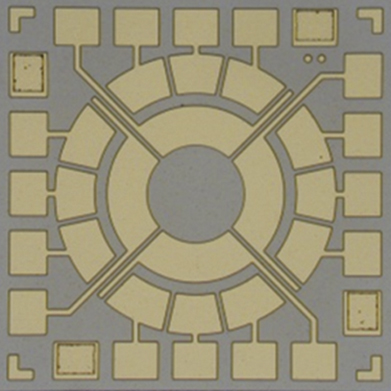Crossref Citations
This article has been cited by the following publications. This list is generated based on data provided by
Crossref.
Rödel, Jürgen
and
Li, Jing-Feng
2018.
Lead-free piezoceramics: Status and perspectives.
MRS Bulletin,
Vol. 43,
Issue. 8,
p.
576.
Liu, Huicong
Zhong, Junwen
Lee, Chengkuo
Lee, Seung-Wuk
and
Lin, Liwei
2018.
A comprehensive review on piezoelectric energy harvesting technology: Materials, mechanisms, and applications.
Applied Physics Reviews,
Vol. 5,
Issue. 4,
Mishra, Anupam
Khatua, Dipak Kumar
De, Arnab
Majumdar, Bhaskar
Frömling, Till
and
Ranjan, Rajeev
2019.
Structural mechanism behind piezoelectric enhancement in off-stoichiometric Na0.5Bi0.5TiO3 based lead-free piezoceramics.
Acta Materialia,
Vol. 164,
Issue. ,
p.
761.
Das Adhikary, Gobinda
Khatua, Dipak Kumar
Mishra, Anupam
De, Arnab
Kumar, Naveen
Saha, Sujoy
Shankar, Uma
Senyshyn, Anatoliy
Rao, Badari Narayana
and
Ranjan, Rajeev
2019.
Increasing intervention of nonferroelectric distortion and weakening of ferroelectricity at the morphotropic phase boundary in
Na0.5Bi0.5TiO3−BaTiO3.
Physical Review B,
Vol. 100,
Issue. 13,
Safaei, Mohsen
Sodano, Henry A
and
Anton, Steven R
2019.
A review of energy harvesting using piezoelectric materials: state-of-the-art a decade later (2008–2018).
Smart Materials and Structures,
Vol. 28,
Issue. 11,
p.
113001.
Zhang, Qianwei
Cai, Wei
Li, Qingting
Gao, Rongli
Chen, Gang
Deng, Xiaoling
Wang, Zhenhua
Cao, Xianlong
and
Fu, Chunlin
2019.
Enhanced piezoelectric response of (Ba,Ca)(Ti, Zr)O3 ceramics by super large grain size and construction of phase boundary.
Journal of Alloys and Compounds,
Vol. 794,
Issue. ,
p.
542.
Kuscer, Danjela
Kocjan, Andraž
Majcen, Maja
Meden, Anton
Radan, Kristian
Kovač, Janez
and
Malič, Barbara
2019.
Evolution of phase composition and microstructure of sodium potassium niobate –based ceramic during pressure-less spark plasma sintering and post-annealing.
Ceramics International,
Vol. 45,
Issue. 8,
p.
10429.
Khobragade, Sandip
Devanuri, Jaya Krishna
and
Patel, Satyanarayan
2019.
Temperature dependent dynamics hysteresis scaling of Ba0.85Ca0.15Ti0.9–xSnxZr0.10O3 bulk ferroelectric ceramics.
Phase Transitions,
Vol. 92,
Issue. 11,
p.
960.
Zhang, Su‐Wei
Zhou, Zhen
Luo, Jin
and
Li, Jing‐Feng
2019.
Potassium‐Sodium‐Niobate‐Based Thin Films: Lead Free for Micro‐Piezoelectrics.
Annalen der Physik,
Vol. 531,
Issue. 7,
Wang, Guo
Hong, Young-Hwan
Nguyen, Hoang Thien Khoi
Kim, Byeong Woo
Ahn, Chang Won
Han, Hyoung-Su
and
Lee, Jae-Shin
2019.
High electromechanical strain properties in SrTiO3‒modified Bi1/2Na1/2TiO3‒KTaO3 lead‒free piezoelectric ceramics under low electric field.
Sensors and Actuators A: Physical,
Vol. 293,
Issue. ,
p.
1.
Thong, Hao-Cheng
Zhao, Chunlin
Zhou, Zhen
Wu, Chao-Feng
Liu, Yi-Xuan
Du, Zong-Zheng
Li, Jing-Feng
Gong, Wen
and
Wang, Ke
2019.
Technology transfer of lead-free (K, Na)NbO3-based piezoelectric ceramics.
Materials Today,
Vol. 29,
Issue. ,
p.
37.
Ito, Yoshiharu
Tateyama, Akinori
Nakamura, Yoshiko
Shimizu, Takao
Kurosawa, Minoru
Uchida, Hiroshi
Shiraishi, Takahisa
Kiguchi, Takanori
Konno, Toyohiko J.
Ishikawa, Mutsuo
and
Funakubo, Hiroshi
2019.
Growth of epitaxial (K, Na)NbO3films with various orientations by hydrothermal method and their properties.
Japanese Journal of Applied Physics,
Vol. 58,
Issue. SL,
p.
SLLB14.
Zhang, Juanjuan
Fang, Chao
and
Weng, George J.
2019.
Three dimensional phase-field simulations on the frequency dependence of polarization vectors and hysteresis loops in ferroelectric crystals.
Journal of Applied Physics,
Vol. 125,
Issue. 8,
Mishra, Anupam
Khatua, Dipak Kumar
De, Arnab
and
Ranjan, Rajeev
2019.
Off-stoichiometry, structural-polar disorder and piezoelectricity enhancement in pre-MPB lead-free Na0.5Bi0.5TiO3-BaTiO3 piezoceramic.
Journal of Applied Physics,
Vol. 125,
Issue. 21,
Zhang, Qianwei
Cai, Wei
Zhou, Chuang
Xu, Ruicheng
Zhang, Shilong
Li, Zhendong
Gao, Rongli
and
Fu, Chunlin
2019.
Electric fatigue of BCZT ceramics sintered in different atmospheres.
Applied Physics A,
Vol. 125,
Issue. 11,
Zhang, Su‐Wei
Luo, Jin
Zhou, Zhen
and
Li, Jing‐Feng
2019.
Sol‐gel processed highly (100)‐textured (K, Na)NbO3‐based lead‐free thin films: Effect of pyrolysis temperature.
Journal of the American Ceramic Society,
Vol. 102,
Issue. 5,
p.
2696.
Zhu, Minglu
Shi, Qiongfeng
He, Tianyiyi
Yi, Zhiran
Ma, Yiming
Yang, Bin
Chen, Tao
and
Lee, Chengkuo
2019.
Self-Powered and Self-Functional Cotton Sock Using Piezoelectric and Triboelectric Hybrid Mechanism for Healthcare and Sports Monitoring.
ACS Nano,
Sheeraz, Muhammad
Khaliq, Abdul
Ullah, Aman
Han, Hyoung-Su
Khan, Aurangzeb
Ullah, Amir
Kim, Ill Won
Kim, Tae Heon
and
Ahn, Chang Won
2019.
Stress driven high electrostrain at low field in incipient piezoelectrics.
Journal of the European Ceramic Society,
Vol. 39,
Issue. 15,
p.
4688.
Duong, Trang An
Erkinov, Farruhk
Nguyen, Hoang Thien Khoi
Ahn, Chang Won
Kim, Byeong Woo
Han, Hyoung-Su
and
Lee, Jae-Shin
2020.
Temperature insensitive piezoelectric properties on the morphotropic phase boundary of BaZrO3-modified lead-free KNN-BLT ceramics.
Journal of Electroceramics,
Vol. 45,
Issue. 4,
p.
164.
Cai, Wei
Zhang, Qianwei
Zhou, Chuang
Gao, Rongli
Wang, Fengqi
Chen, Gang
Deng, Xiaoling
Wang, Zhenhua
Deng, Nengyun
Cheng, Li
and
Fu, Chunlin
2020.
Effects of oxygen partial pressure on the electrical properties and phase transitions in (Ba,Ca)(Ti,Zr)O3 ceramics.
Journal of Materials Science,
Vol. 55,
Issue. 23,
p.
9972.
